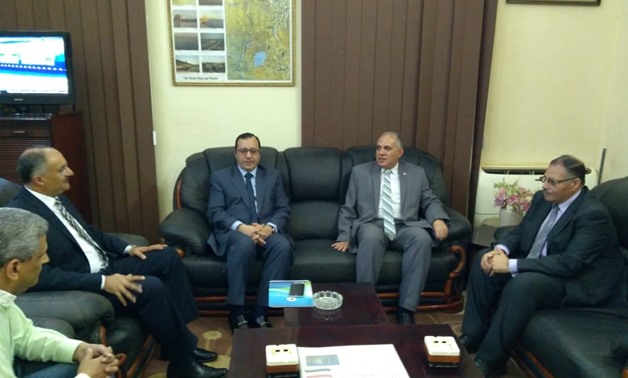
FILE: Egyptian Minister of Irrigation Mohamed Abdel Ati
CAIRO – 18 September 2018: Minister of Water Resources and Irrigation Mohamed Abdel Ati visited on Tuesday the inspector general of the Egyptian Irrigation in Khartoum, Sudan.
This comes as a part of his official visit to Sudan to attend the first meeting of the 58th session of the Permanent Technical Authority for Nile Water.
During his visit, he met with Egyptian and Sudanese workers of the Egyptian Irrigation Mission and inspected the works done at the headquarters of the inspector general of the Egyptian Irrigation in El-Shagara Area, Khartoum.
This was followed by his visit to the Egyptian Irrigation Museum and the kindergarten established for the children of Sudanese workers at El-Shagara area.
Ayman Abdel Salam Shedid, head of the Central Administration of Egyptian Irrigation in Sudan, said that the Egyptian Irrigation Mission works in harmony with the brotherly Sudanese people to implement the tasks entrusted to them to upgrade the buildings and facilities for the Egyptian Irrigation in Sudan.
Minister of Water Resources and Irrigation Abdel Ati arrived on Tuesday morning in Khartoum, Sudan, to participate in the first meeting of the 58th session of the Permanent Technical Authority for Nile Water.
Abdel Ati was received by Sudanese minister of water resources, irrigation and electricity, Egyptian ambassador to Sudan and the head of Egyptian irrigation mission in Sudan.
It has been agreed to “continue implementing the outcomes of the Addis Ababa-held Egyptian-Sudanese-Ethiopian tripartite summit on the Renaissance Dam to carry out the Declaration of the Renaissance Dam Principles Charter that was signed on March 23, 2015 in Khartoum,” said President Abdel Fatah al- Sisi in a joint press conference with Sudanese President Omar al-Bashir in March.
Egypt has voiced its concern over Ethiopia’s dam construction, as it would affect Egypt’s 55 billion cubic meter share of the Nile water. However, Addis Ababa sees the dam is necessary for its development and will not negatively affect the downstream countries (Egypt and Sudan).
Egypt suffers from a water deficit of 30 billion cubic meters; it annually needs at least 90 billion cubic meters of water to cover 90 million citizens’ needs. However, it currently has only 60 billion cubic meters, of which 55.5 billion cubic meters come from the Nile and just 5 billion cubic meters come from non-renewable subterranean water in the deserts.
Further decrease in Egypt's water resources is expected amid the construction of the
Grand Ethiopian Renaissance Dam (GERD), which could have a negative impact on Egypt’s Nile water share.
Despite the latest negotiations between Ethiopia, Egypt and Sudan to resolve the technical issues of the dam, Egypt is keen to look for new sources of water and to rationalize its usage to overcome any water scarcity problems in the future.
Agriculture in Egypt depends heavily on the Nile River, and it consumes 84 percent of Egypt’s water resources; therefore, the state is working on maintaining the country's water security through taking procedures that may help rationalize the use of water.
The government has taken procedures aiming to rationalize water consumption through preventing the cultivation of crops that need large amounts of water.
Minister of Irrigation and Water Resources Abdel Ati decided to reduce the rice agriculture area in Egypt from 1,700,000 feddans to 724,200 feddans (1 feddan = 1.038 acres).
According to the ministry, this decline will save 3 billion cubic meters of water. Simultaneously, the ministry is working on launching campaigns to raise farmers’ awareness and rationalize water usage.

Comments
Leave a Comment